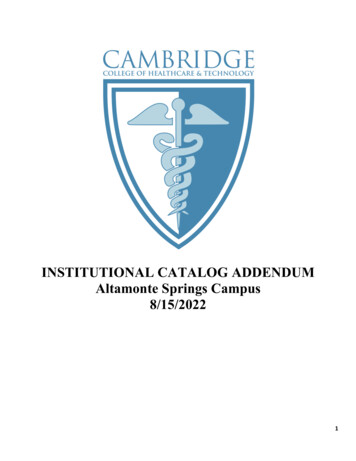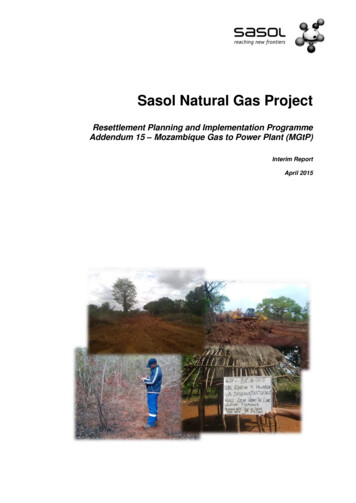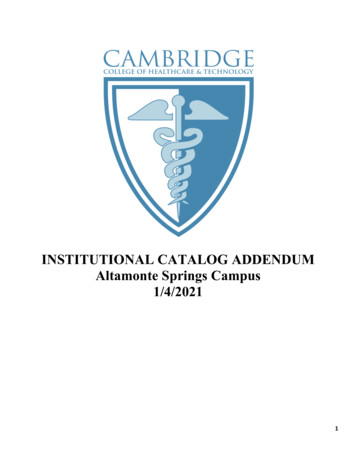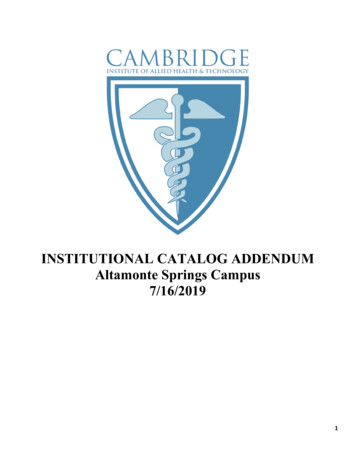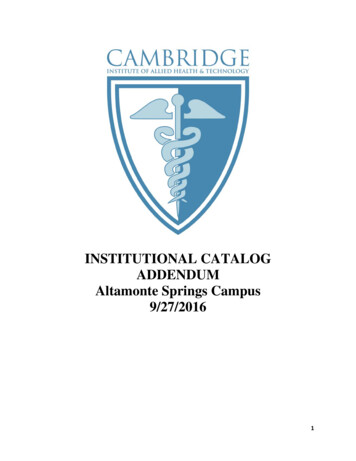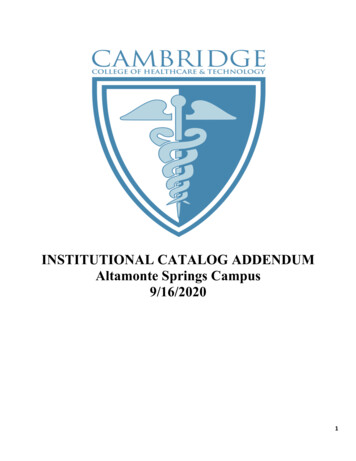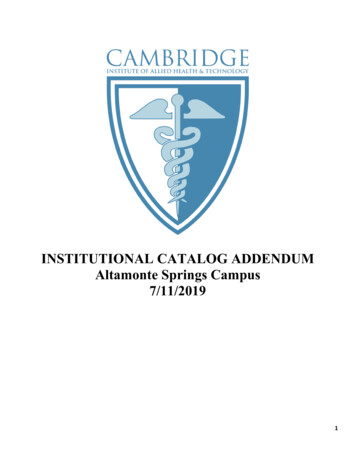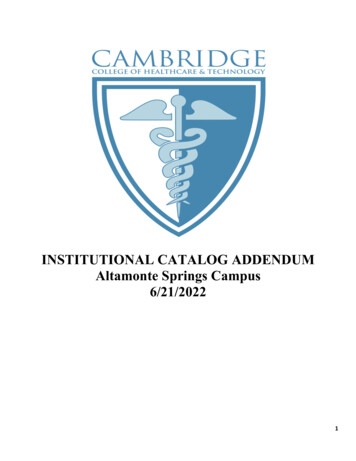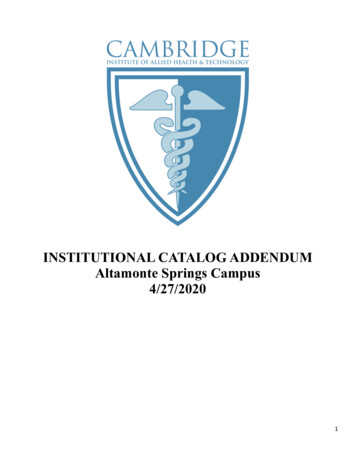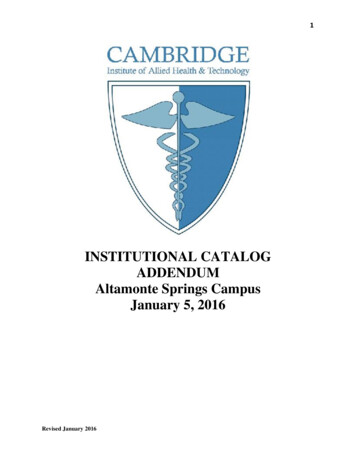
Transcription
1INSTITUTIONAL CATALOGADDENDUMAltamonte Springs CampusJanuary 5, 2016Revised January 2016
2FACULTY & ADMINISTRATION:CORPORATE ADMINISTRATIONDr. Terrence W. LaPier, Ph.D. - PresidentDavid Colozzi-Chief Operating OfficerJulie Orloff, M.Ed., CMA, RMA, CPC – Vice President of Compliance & RegulatoryLaura Selvey – Corporate Director of Financial AidDominique Werner – Corporate RegistrarAdrian Rorie, BBM – ControllerCAMPUS ADMINISTRATIONCynthia Abromitis, MAEd, RDMS, RVT, RT (R) - Interim Campus Director – Full TimeGordon Hunt – Director of Admissions – Full TimeDaisy Tabachow - Financial Aid Manager – Full timeKatherine Miranda – Registrar – Full TimeTheresa McKenzie - Career Services Director – Full TimeAysegul Kapucu - LibrarianEDUCATIONDr. Jennifer L. Norton RT(R), DOM – Full TimeNiagara County Community CollegeSanborn, New YorkFlorida College of Integrative MedicineOrlando, FloridaMedical Assistant Program DirectorYolande Bain, LPN – adjunctValencia Community College, Orlando FL.AS General EducationPN, Lincoln Technical, Orlando FL.Practical Nursing InstructorSteve Mathis, BMO - adjunctCentral Florida Institute---Orlando, FLMedical Assistant and Electronic Medical Records InstructorMargaret Muni, LPN – adjunctDorothy Aristone School of NursingMaple Shade, New JerseyPatient Care Technician InstructorCarmen Brown, RN, BSN - adjunctCentral Michigan University, MichiganMedgar Evers College, New YorkNursing Assistant InstructorRevised January 2016
3Marsha Pearce, LPN – Full TimeSeminole Community CollegeSanford, FloridaPatient Care Technician InstructorSheena King – adjunctEverest College – Medical Assistant – Orlando FLPhlebotomy InstructorHeather Cintron, RN -adjunctRollins College – BS PsychologySeminole State College – AS NursingPN InstructorRosalie Villecco, BSN, CARN – Full TimeDaytona State College – Daytona BeachUniversity of Central Florida - OrlandoProgram Director, Practical NursingBrandy Greer, RN – adjunctUniversity of Central Florida - BSN, Orlando FLSeminole State College – AS Nursing, FLPractical Nursing InstructorDuane Carr, RN - adjunctNursing – Valencia Community College – Orlando, FLPhlebotomy InstructorRobin Hobbs, RN - adjunctNursing – Excelsior College – Albany, NYPractical Nursing InstructorFiona Mackay, RN, MSN - adjunctChamberlain College of Nursing, OnlinePractical Nursing InstructorHassan Khan, NP - adjunctFIU – Master of Science Nursing—Miami, FLFIU – Bachelors of Science Nursing – Miami, FLPractical Nursing InstructorKaren Schmitt, RN - adjunctSeminole State College—Sanford, FLPractical Nursing InstructorRevised January 2016
4Skye Roberts, RN - adjunctBethune-Cookman University—Daytona Beach, FLPractical Nursing InstructorCarolyn Lake, RN - adjunctSouth Florida Community College – ASN, Avon Park, FLPractical Nursing InstructorSamantha Paramesvaran, BSN, MSN - adjunctJohns Hopkins University—Baltimore, MDUniversity of Central Florida—Orlando, FLPractical Nursing InstructorGregory Atkins, RN - adjunctHerzing University—Winter Park, FLPractical Nursing InstructorCaron Drake, BSNBachelors-Nursing-Union College-Lincoln, NebraskaPractical Nursing InstructorGeneral Education InstructorsAdrian IsazaPalmer College of Chiropractic Medicine – Doctor in Chiropractic MedicineHofstra University – Hempstead, NY – BS SpanishNY School of Medical Assistant – Long Island, NY – Medical Assistant – DiplomaTheresa Madison, PhDBarry University – Miami Florida – Leadership Education and CounselingUniversity of Georgia – Georgia – Masters in Social WorkGeorgia State – Georgia - Bachelors in Social WorkClayton College, Ga – AS in PsychologyVocational Technical Center – Orlando – Medical Assistant – DiplomaColette PurcellNova Southeastern University, South Florida – Masters in Business AdministrationAtlantic Union College – South Lancaster, Mass – Bachelors in computer Information SystemsLori SchwartzUniversity of Michigan – MI – Masters in Public HealthUniversity of Michigan – MI – Masters of Science Human GeneticsState University of NY – Binghamton, NY – Bachelors in BiologyRevised January 2016
5Ursula Scott, PhDCapella University – Online – PhD in Higher EducationNova Southeastern University – online – Masters in EnglishSouth Carolina State, Orangeburg SC – BA in Professional EnglishAvner SteinUniversity of South Florida – Tampa, FL – MBAUniversity of Florida – Gainesville, FL – Bachelors in Computer, Information ScienceACADEMIC SCHEDULEThe following dates are potential start dates for each program of study and the expectedcompletion date. These dates are subject to change, according to enrollment numbers andchanges in a student’s progression through the program.Start CalendarPatient Care TechnicianNursing AssistantRevised January 2016DayDayStartAnticipated /201610/24/2016
6PhlebotomyPractical NursingPractical NursingAssociate of Science in NursingDayDayEveDayMedical AssistantMedical Billing and CodingRevised January 1711/30/201611/17/20175/2/20162/3/2017
7Scheduled Breaks:Spring 2016:March 21-25Summer 2016: July 4-8Winter 2016: December 19-30 January 2-6Holiday ScheduleStudents do not attend class on the following holidays:New Year’s DayMartin Luther King, Jr. DayPresident’s DayMemorial DayIndependence Day (Observed)Labor DayVeterans DayThanksgiving Day & day after Thanksgiving DayChristmas Eve & Christmas DayHours of OperationMonday thru Friday 8:30am – 10:00pmUpdate to the Catalog – Financial Information Page 7-9Updated parameters and awarding methods for FSEOG.Directions: The max award is 750 for each campus per FAFSA award year. This is first come first awarded grant, with the lowest EFC starting at Zero and thestudent is Pell Grant eligible. The Processing Dates on the FAFSA is evaluated to see who applied first to theinstitution One Grant is awarded for the Award Year and per Academic Year The FSEOG is set up in two (2) disbursements The new awards start with every July class going forward Existing students are also eligible to receive the FSEOG based on need and under thefollowing selection criteria: Existing students must be at the beginning of a new academic yearRevised January 2016
8 New students are given first priority, then if funds are available, existing studentscan be reviewed for eligibility Students must not be on Satisfactory Academic Progress (SAP) Warning orProbation The student has not received a prior award in that same academic year (i.e. thestudent can only receive one full FSEOG grant per academic year and a full grantis defined as 750) Processing dates on the ISIR apply if in a new award year, so students whocomplete their FAFSA early will be considered first for a FSEOG awardWithdraw PolicyOfficial withdrawal from the course, no credit earned. If a student's last date of attendance is atthe 20% point of attendance of a course, they will receive a grade of F. If a student's last date ofattendance is before the 20% point of attendance of course, they will receive a grade of W. Fullrefund of tuition applies when a student has withdrawn from courses after the add/drop, but lessthan 20% of each course.The add/drop period for a course that is 16 weeks in length, is two weeks from the start of thecourse. The add/drop period for a course that is 8 (correction) weeks in length, is one week fromthe start of the course.Refund Policy for Non-Title IV StudentsThe refund policy for students that are not Title IV Eligible will be 30 days from the lastdate of determination.The Crossroad Scholarship will no longer be offered at this time.Update to the Catalog – Leave of Absence page 19-20Leave of AbsenceIn the event of an emergency, Cambridge Institute of Allied Health & Technology may grant aleave of absence. However, when students are not in regular attendance, they jeopardize thequality of their education. Therefore, a leave of absence is discouraged.A leave of absence must be requested in writing on an official Leave of Absence Formobtainable from the administrative office of Cambridge Institute of Allied Health & Technologyprior to the beginning of the proposed requested leave. A leave of absence must be approved bythe Program Director and/or the Academic Dean and may not exceed 180 days or the start of thenext available class at the current location, whichever event shall first occur. Only one leave ofabsence per academic year is permitted.Revised January 2016
9Update to the Catalog – Page 21 Academic AffairsCommitteeThe Academic Affairs Committee shall be responsible for evaluating the performance of astudent in poor academic standing. The committee will recommend whether the student shouldbe dismissed from the program. The committee is also responsible for recommending dismissalfor poor attendance or for other grounds for dismissal as stated in this student handbook. Thecommittee will have 5 members of the following: Selected Faculty Members Moderator Program RepresentativeUpdate to the Catalog – Programs page 28Medical AssistantDiploma ProgramMethod of Delivery: Residential46 weeks/ 1150 clock hoursProgram DescriptionMore and more medical offices desire to hire medical assistants who possess diverse skill sets.Graduates of the program who choose to take the Basic X-ray Machine Operator may do so, andif the exam is successfully passed, they may perform limited X rays in multiple healthcaresettings. Other settings in which an Advanced Medical Assistant and Imaging Specialist can seekemployment include physician’s offices, outpatient medical facilities, hospital, imaging centers,clinics, mobile imaging units or other related health care setting. Specific course objectives relateto administrative procedures that include use of computerized practice management software,medical billing, and insurance codes, office supplies, collections, correspondence, knowledgeand appointment scheduling. Course objectives relative to clinical procedures include: anatomy& physiology, medication administration, injections, EKG, assisting with minor surgicalprocedures, phlebotomy and lab procedures in a physician’s office, outpatient medical facility,hospital and other related healthcare settings. Student must complete a 200 hour externship in anambulatory care medical facility. Program graduates are eligible to take the followingcredentialing examinations: Registered Medical Assistant (RMA) through the American MedicalTechnologists (AMT) or Certified Medial Assistant exam (CMA through the AmericanAssociation of Medical Assistants. The National Certification for Phlebotomy Technicianexamination may be taken (not required by the state) when the applicable number ofvenipuncture’s and capillary sticks have been obtained and documented by an employer.HC101XR101XR102XR103Health Core & Body SystemsIntroduction to Radiography for the Medical AssistantRadiography of the Chest, Upper Extremities, and Shoulder GirdleRadiography of the Lower Extremities, Abdomen and PelvisRevised January 2016100807070
10XR104MA 100MA101MA103MA104MA105PH101MA106MA107Radiography of the Skull and SpineIntroductions to Medical AssistingAdministrative Medical Office ProceduresAnatomy & Physiology/Related DiseasesElectrocardiographyPharmacology/ Medication AdministrationPhlebotomyClinical ProceduresMedical Assistant Externship702080808080120100200Course DescriptionXR101 Introduction to radiography for the Medical Assistant80 hoursThis course instructs the student in basic physics of radiographic exposure, principles ofradiation protection, and patient care management. This course also includes digital imagereceptors, the x-ray darkroom, film critique, standards of professionalism and ethics. Emphasisis placed on PACS (Picture Archiving and Communications Systems).Prerequisites: NoneXR102 Radiography of the Chest, Upper Extremities, and Shoulder Girdle 70 hoursThis course includes radiological and positioning terminology for the chest, upper extremities,and shoulder girdle.Prerequisites: NoneXR103 Radiography of the Lower Extremities, Abdomen and Pelvis70 hoursThis course includes radiological and positioning terminology for the lower extremities,abdomen, and pelvis.Prerequisites: NoneXR104 Radiography of the Skull and Spine70 hoursThis course includes anatomy of the Skull and Spine with terminology and radiographicpositioning, procedures, and techniques.Prerequisites: NoneHC101 Heath Core and Body Systems100 hoursThis course includes health care delivery system, health occupations, communication,interpersonal skills, computer literacy, infection control, and recognition and response toemergency situations. This course also includes safety and security, ethical and legal issues,employability skills, basic math and science, and wellness and disease concepts. In addition,students receive instruction and certification in HIV/AIDS, Domestic Violence, and OSHA.Students in this course become familiar with Basic X Ray machine operations.Prerequisites: NoneMA 100 Introduction to Medical Assisting20 hoursThis course is designed to introduce the student to the healthcare field of Medical Assisting.Prerequisites: NoneRevised January 2016
11MA101 Administrative Medical Office Procedures80 hoursThis course is designed to introduce the student to office processes. Included is knowledge ofinsurance, preparing claims, billing, coding, basic bookkeeping, and accounting. Transcriptionand documentation are introduced. Computer software is introduced and used in the computerlab. It also introduces the student to the office environment and initial front office procedures.Ethical and legal issues are discussed. Principles of oral and written communications areintroduced. The student is introduced to computerized practice management, electronic healthrecords, and appointment scheduling system software as they learn about scheduling, referrals,and the office communications.Prerequisites: NoneMA103 Anatomy & Physiology/Related Diseases80 hoursThis course includes fundamental anatomy and physiology of the human body. The student isintroduced to selected body systems as well as common diseases related to each, Included arenervous, senses, skin, skeletal, muscular, and immune system.Prerequisites: NoneMA104 Electrocardiography80 hoursThis course is designed to teach the student how to perform a 12-lead Electrocardiogram.Included are basic anatomy and electrophysiology of the heart. The student will be able toidentify sinus rhythms as well as life-threatening dysrhythmias. Lab included.Prerequisites: NoneMA105 Pharmacology/ Medication Administration80 hoursThis introduces the student to basic pharmacology and medication administration. Included aredrug classifications, calculations, abbreviations, and safety. The student is instructed inpreparation and administration of medications including injections.Prerequisites: NonePH101 Phlebotomy120 hoursThis course includes an introduction to phlebotomy, equipment, safety, and specimen collectiontechniques. The student receives instruction in anatomy, infection control, special procedures anddocumenting competency skills.Prerequisites: NoneMA106 Clinical Procedures100 hoursThis course instructs the students in the following clinical duties and responsibilities, clinicalduty preparation, medical database, exam preparation and related clinical procedures, laboratory& specimen collection, diagnostic tests and procedures, minor surgical procedures, acute illness,accidents, and emergencies.Prerequisites: NoneMA107 Medical Assisting ExternshipRequired classes: All theory and lab classesRevised January 2016200 hours
12The medical assistant externship will be completed in a physician’s office, outpatient medicalfacility, hospital, or other relative healthcare setting.Prerequisites: NoneUpdated Fee Schedule page 10 of the CatalogProgramApplication FeeTuitionMedical AssistantAS in NursingMedical Billing andCodingPhlebotomyPractical NursingNursing Assistant 50.00 50.00 50.00 14,000.00 46,750.00 14,300.00Other Fees not inTuition 30.00 Grad Fee 30.00 Grad Fee 30.00 Grad Fee 50.00 50.00 50.00 1,916.00 21,825.00 1,056.00N/A 30.00 Grad FeeN/ANursingAssociate in Science Degree Program1725 Hours77 Semester Credits96 Instructional WeeksProgram DescriptionThe Associate in Science Nursing program at Cambridge Institute of Allied Health &Technology is designed to provide training and education in order to prepare graduates to plan,deliver, and manage patient care as registered nurses in a variety of settings. The program offersstudents the opportunity to learn to effectively function as an integral part of the interdisciplinaryteam in a complex healthcare delivery system. At the completion of the program, graduates whohave attended class and their clinical rotations, studied, and practiced their skills should have theability to make successful application for state licensure and, upon passing the required stateexamination, to seek entry-level employment as registered nurses.The requirements of the Program for graduation are as follows: Completion of all program courses with a satisfactory grade of 75% or above in theoryand a passing grade in all clinical courses Completion with an earned grade point average of 2.5 or above Tuition accounts satisfied Completion of a practice NCLEX-RN exam with a minimum passing score of 75%. Ifbelow 75%, evidence of remediation in identified areas is necessary.Core CurriculumCodeCourse NameNUR111Nursing Concepts115NUR112Nursing Fundamentals345NUR112CNursing Fundamentals Clinical290Revised January 2016
045NUR220NUR220CNUR243CNUR250NUR250CNursing Fundamentals LabMedical/Surgical Nursing 1Medical/Surgical Nursing 1 ClinicalMedical/Surgical Nursing 1 LabPharmacology in Nursing Practice IPharmacology in Nursing Practice IIMaternal-Child NursingMaternal-Child Nursing ClinicalIntegrated Medical/ Surgical Nursing IIntegrated Medical/Surgical Nursing IClinicalIntegrated Medical/ Surgical Nursing ILabIntegrated Medical/ Surgical Nursing IIIntegrated Medical/ Surgical Nursing IIClinicalMental Health NursingMental Health Nursing ClinicalNursing PreceptorshipAdvanced Maternal/Infant NursingAdvanced Maternal/Infant Nursing C150LNUT180PSY1012SPC1016Anatomy & Physiology IAnatomy & Physiology I LabAnatomy & Physiology IIAnatomy & Physiology II LabIntroduction to ComputersEnglish CompositionIntroduction to Health ScienceCollege AlgebraMedical TerminologyMicrobiologyMicrobiology LabNutritionIntroduction to PsychologyFundamentals of 1725NUR212LNUR213NUR213CGeneral EducationTotalRevised January 2016
14Course DescriptionsBSC 1085 - Anatomy & Physiology I3 Credits45 Clock HoursIn this course will explore the human body as a whole, its levels or organization, the terms usedin describing body structure and directional terms, homeostatic mechanisms, the relationship ofstructure and function and how they relate to each other and homeostasis as directed by eachbody system involved. Anatomy and Physiology I will focus on the cells, cell metabolism,tissues and membranes, integumentary system and body temperature, skeletal system, muscularsystem, nervous system tissue and brain, nervous system spinal cord & peripheral nerves,autonomic nervous system and special senses. Prerequisites: NoneBSC 1085L - Anatomy & Physiology I Lab1 Credit30 Clock HoursStudents will explore the structure and function of tissues and organs in a laboratory setting.Co-requisite: BSC 1085BSC 1086 - Anatomy & Physiology II3 Credits45 Clock HoursThis course is a continuation of BSC 1085 lecture. Students will continue to will explore thehuman body as a whole, its levels or organization, the terms used in describing body structureand directional terms, homeostatic mechanisms, the relationship of structure and function andhow they relate to each other and homeostasis as directed by each body system involved.Anatomy and Physiology I will focus on the endocrine system, cardiovascular system, includingblood circulation, heart anatomy and electrical conduction and disease, lymphatic system,respiratory system, gas exchange, digestion, excretory, urinary, male and female reproductionsystems.Prerequisites: BSC1085, BSC1085LBSC 1086L - Anatomy & Physiology II Lab1 Credit30 Clock HoursStudents will explore the structure and function of tissues and organs in a laboratory setting. Thiswill include visiting the office of the Medical Examiner, Video web cast of dissections andautopsies.Prerequisites: BSC1085, BSC 1085L; Co-requisite BSC1086CTS 1050 - Introduction to Computers3 Credits45 Clock HoursStudents will learn the basic operation of Microsoft Word, Excel, and PowerPoint. Student willlearn proper techniques for business letter writing and resume writing.Prerequisites: NoneENC 1101 - English Composition3 Credits45 Clock HoursStudents will learn grammar, punctuation and usage skills that are useful in everyday language.The goals of effective writing will be covered as well as essay preparation. Students will takeseveral mastery and editing tests as part of the course.Prerequisites: NoneHSC 1000 - Introduction to Health Science3 Credits45 Clock HoursStudents will examine the following topics: The healthcare professions and teams, interactionsbetween and reactions of patients in altered physical &/or mental states including gerontologyRevised January 2016
15and diverse cultures, professionalism and professional organizations, vital signs, OSHAstandards, asepsis and isolation techniques including universal precautions, ethics and legalconcerns of the healthcare provider, lifting/moving/body mechanics, patient and environmentalemergency assessment and response, and Basic Cardiac Life Support (BCLS). The student willpossess the aptitude to comprehend and use information in both written and oral formats.Prerequisites: NoneMAC 1105 - College Algebra3 Credits45 Clock HoursStudents in this course will explore college algebra through a detailed examination of practicalapplications. Students will calculate algebraic problems with linear equations, exponents,polynomials, factors, and rational expressions. Student will solve problems using graphs, slopes,inequalities, linear equations, roots, radicals and quadratic equations.Prerequisites: NoneMEA 1239 - Medical Terminology2 Credits30 Clock HoursThis course will provide students with instruction in how to decipher useful medical terminologyinto everyday language. Students analyze and learn prefixes and suffixes, spelling use andcorrect pronunciation. Medical abbreviations and symbols are included.Prerequisites: NoneMIC150 – Microbiology3 Credits45 Clock HoursThis is an introduction course emphasizing the classification, physiology, and pathology ofmicroorganisms.Prerequisites: NoneMIC150L – Microbiology Lab1 Credit30 Clock HoursStudents will explore the classification, physiology, and pathology of various microorganisms.Prerequisites: None; Co-requisites: MIC150NUR111 – Nursing Concepts1 Credit15 Clock HoursNursing Concepts introduces nursing as a caring, holistic and critically thinking profession.Studying the historical nursing perspectives, Nightingale through modern holistic, and conceptscritical to professional nursing are traced. Theories of the profession will be explored and anemphasis placed on the theory of Dorothea Orem as a method for organizing thinking andnursing practice. Concepts that shape a profession like healthcare delivery systems, ethicalconsiderations, professional behaviors and values are also considered. And, concepts necessaryto provide nursing care like: the nursing process, therapeutic communications, teaching/learningprocesses, advocacy, interdisciplinary teamwork and the health/illness continuum are examined.Throughout the course, students have the opportunity to identify their own learning styles andbegin to create strategies for positive learning and personal wellness.Prerequisites: NoneNUR112 – Nursing Fundamentals3 Credits45 Clock HoursThe emphasis in Nursing Fundamentals is on the normal foundations necessary for a nurse toapply critical thinking processes during both health and illness. The theory of Dorothea Oremand the conceptual framework of the program are integrated with foundational nursing conceptsRevised January 2016
16as a means of exploring normal human functioning. Areas discussed include: assessment,diagnostic and pharmacological resources, accountability through documentation, and,foundational concepts for normal human functioning and wellness.Prerequisites: BSC1085, BSC1086, NUR111NUR112C – Nursing Fundamentals Clinical2 Credits90 Clock HoursNursing Fundamentals Clinical provides selected patient experiences in a variety of settings andassists the student to incorporate both theory and college lab skills. The clinical focus is on thepractice of assessment, diagnostic and pharmacological resources, accountability throughdocumentation, and foundational concepts for normal human functioning and wellness withinthis practice, the student identifies self-care deficits and therapeutic demands for patients withcommonly occurring health limitations.Prerequisites: BSC1085, BSC1086, NUR111; Co-requisites: NUR112NUR112L – Nursing Fundamentals Lab1 Credit30 Clock HoursNursing Fundamentals Lab presents an introduction to basic technical nursing skills sets that areeither utilized or delegated by the nurse to implement the nursing process. While practicingbasic patient care skills students find a supportive and supervised environment where increasingconfidence and competence is encouraged.Prerequisites: BSC1085, BSC1086, NUR111; Co-requisites: NUR112NUR123 – Medical/Surgical Nursing I3 Credits45 Clock HoursThis course builds on the foundations of nursing by considering stressors that affect anindividual’s level of wellness by inflicting intermediary self-care physical and/or mentallimitations. Stressors explored will include, but are not limited to, commonly occurring healthlimitations that alter one’s state of wellness and thus require therapeutic nursing demands forself-care and a change in one’s wellness status. Critical thinking models for human functioningand independent nursing interventions will be further explored and expanded to include detailednursing processes, care management, interdisciplinary healthcare team approaches and holisticconsiderations for selected stressors.Prerequisites: MIC150, MIC150L, NUR112, NUR112C, NUR112L, NUR145, NUR146,NUT180NUR123C – Medical/Surgical Nursing I Clinical 2 Credits90 Clock HoursMedical/Surgical Nursing 1 Clinical provides selected patient experiences in a variety of settingsand assists the student to incorporate both theory and college lab skills. The clinical focus is onthe practice of beginning medical/surgical technical nursing skill sets that are utilized ordelegated by the nurse. Within this practice, the student identifies self-care deficits andtherapeutic demands for patients with commonly occurring health limitations.Prerequisites: MIC150, MIC150L, NUR112, NUR112C, NUR112L, NUR145, NUR146,NUT180;Co-requisite: NUR123NUR123L – Medical/Surgical Nursing I Lab1 Credit30 Clock HoursMedical Surgical Nursing 1 Skills Laboratory provides the knowledge and practice for beginningmedical/surgical nursing skills sets that are used by the nurse to implement the nursing processRevised January 2016
17and manage care. Students find a supportive and supervised environment where increasingconfidence and competence is encouraged while practicing medical/surgical patient care skills.Prerequisites: MIC150, MIC150L, NUR 112, NUR112C, NUR112L, NUR145, NUR146,NUT180;Co-requisite: NUR123NUR145 – Pharmacology in Nursing Practice I2 Credits30 Clock HoursPharmacology in Nursing Practice I assists the beginning professional nursing student tounderstand pharmacotherapeutic concepts that are necessary for safe adult medical/surgicalnursing practice. The major drug classifications are introduced in the context of humanfunctioning and self-care deficits. For each classification the student considers: data collection,dosage/administration, evaluating and maximizing therapeutic effects, minimizing adversereactions/interactions, managing toxicity and patient education.Prerequisites: BSC1085, BSC1085L, BSC1086, BSC1086L, MAC1105NUR146 – Pharmacology in Nursing Practice II1 Credit15 Clock HoursPharmacology in Nursing Practice assists the professional nursing student to understandpharmacotherapeutic concepts that are necessary for safe administration of medications forpediatric, reproductive health and advanced medical/surgical nursing practice. The major drugclassifications, in the context of human functioning and self-care deficits, are reinforced. Foreach classification the student considers: data collection, dosage/administration, evaluating andmaximizing therapeutic effects, minimizing adverse reactions/interactions, managing toxicity,patient education, managing IV therapy, chemotherapy, and blood administration.Prerequisites: NUR145NUR163 – Maternal-Child Nursing3 Credits45 Clock HoursMate
Hofstra University - Hempstead, NY - BS Spanish NY School of Medical Assistant - Long Island, NY - Medical Assistant - Diploma . FL - MBA University of Florida - Gainesville, FL - Bachelors in Computer, Information Science ACADEMIC SCHEDULE The following dates are potential start dates for each program of study and the expected
